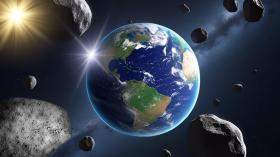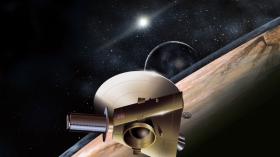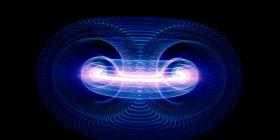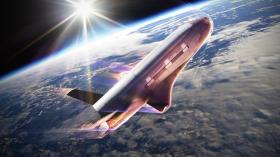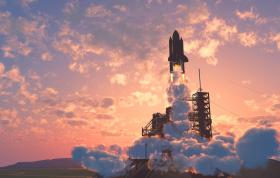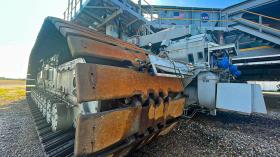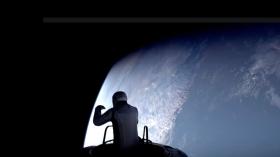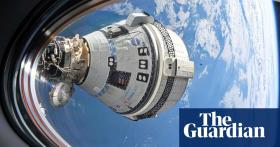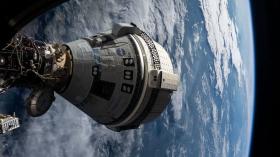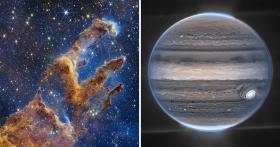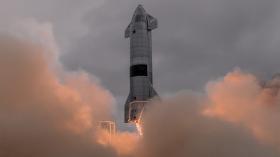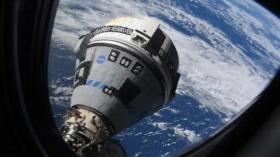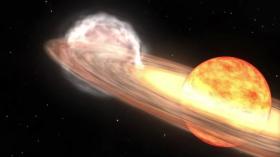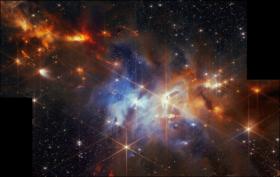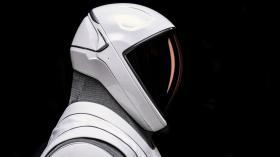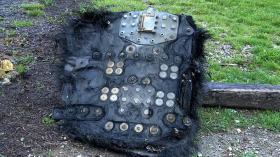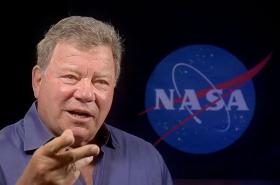#Space
Science & Technology | Science
The solar system is teeming with 1 million 'alien invaders' from Alpha Centauri
The solar system could be packed with 1 million alien visitors, space rocks shaken away from our cosmic neighbor Alpha Centauri, new research has revealed.
Science & Technology | SCIENCE
New Horizons Probe to Cross Termination Shock Zone 20 Years After Voyager 1
Instruments aboard the much newer spacecraft should give us new insights.
Science & Technology | Cool Stuff
An Engineer Says He’s Found a Way to Overcome Earth’s Gravity
This new propulsion system could rewrite the rules of spaceflight—not to mention completely defy conventional physics.
Science & Technology | Science
Interstellar tunnel discovered near our solar system - could lead to other star systems
Astronomers have mapped the Local Hot Bubble, revealing its complex shape and a tunnel that could connect to other galactic structures
Science & Technology | Cool Stuff
Astrophysicist claims he has cracked the code for time travel
After years of research, Professor Mallett claims to have finally developed the revolutionary equation for time travel.
Science & Technology | Cool Stuff
Top-secret X-37B space plane will execute 'never-before-seen maneuvers' on its descent to Earth | Live Science
Although it isn't clear what the X-37B is used for, its new maneuver would help it to evade detection and perform undetected low-passes over Earth.
Science & Technology | Cool Stuff
Starship vs. Saturn V: What's the Difference?
Discover the key differences between SpaceX's Starship and NASA's Saturn V, including design, purpose, and technological advancements.
Science & Technology | Science & Space
NASA's crawler playing key role in Artemis Program
NASA's crawler playing key role in Artemis Program
Science & Technology | Science
Space photo of the week: Space X's Polaris Dawn astronauts 'touch the void' on 1st-ever private spacewalk
SpaceX Polaris Dawn astronaut Jared Isaacman briefly "touched the void" as he embarked on the first-ever private spacewalk Thursday (Sept. 12).
Science & Technology | Science
Supermoon — what is it and when is the next one?
Learn what makes a supermoon unique, how it impacts the moon's brightness, and when you can catch the next one in our ultimate supermoon guide.
Science & Technology | Science
Nasa to say when astronauts ‘stuck’ in orbit will return – but still unsure how
Sunita Williams and Butch Wilmore expected to be in space for days but issues with Boeing’s Starliner spacecraft mean they may not be back until 2025
Science & Technology | SCIENCE
NASA considers sending Boeing Starliner astronauts home on SpaceX Dragon
As Starliner's planned 10-day mission stretches past two months, the next ISS SpaceX launch will now delay into September to give NASA the option of including the Starliner crew on its ride home.
Science & Technology | Science
The 10 Best James Webb Space Telescope Photos (So Far)
The James Webb Space Telescope has turned two years old. To celebrate the occasion, here are its 10 best space photos so far.
Science & Technology | Cool Stuff
SpaceX’s Starship may mess up the lunar surface | Popular Science
A Starship landing on the moon could contaminate nearby ice.
Science & Technology | Cool Stuff
Shattered Russian satellite forces ISS astronauts to take shelter in stricken Starliner capsule | Live Science
ISS astronauts, including the stranded Butch Willmore and Sunni Williams, have sought refuge inside their docked spacecraft after the Resurs-P1 satellite splintered apart in orbit.
Science & Technology | Cool Stuff
NASA predicts 'once-in-a-lifetime event' this summer – 5 things you need to know
NASA scientists say an impending nova event this summer will be so bright that it can be seen from Earth with the naked eye. "It’s a once-in-a-lifetime event," NASA said.
News | News Items
First of Its Kind Detection Made in Striking New Webb Image - NASA Science
Alignment of bipolar jets confirms star formation theories For the first time, a phenomenon astronomers have long hoped to directly image has been captured by NASA’s James Webb Space Telescope’s Near-Infrared Camera (NIRCam). In this stunning image of
Science & Technology | Cool Stuff
The 1st 'major lunar standstill' in more than 18 years is about to occur. Here's how to see it. | Live Science
A major lunar standstill is about to occur. The phenomenon happens every 18.6 years when the moon rises and sets at its most extreme points on the horizon, while also climbing to its highest and lowest point in the sky.
Science & Technology | Science & Space
SpaceX reveals new sleek spacesuits ahead of upcoming historic mission | Popular Science
The Extravehicular Activity (EVA) suits will be worn during the Polaris Dawn spacewalk and feature HUD visor displays.
Science & Technology | Science
NASA exoplanet hunter finds 'weird' world surviving a star's relentless bombardment — it's named Phoenix
NASA's TESS exoplanet hunter has discovered a weird world called Phoenix that has managed to hold on to its atmosphere despite being relentlessly bombarded with radiation from its red giant star.
Science & Technology | Science & Space
On remote trail, man stumbles upon heavy, mysterious object possibly from outer space
A Haywood County man is sharing his story after he recently discovered a mysterious, heavy object that may have been from outer space -- on a remote trail.
Entertainment | William Shatner
International Space Development Conference 2024 beams up Star Trek's William Shatner and more in Los Angeles
The stars of Star Trek are about to get a taste of real-life space exploration when they beam into the 2024 International Space Development Conference in Los Angeles this weekend.
Psychology | Health & Wellbeing
Protecting Dark Sky Country - NOEMA
Artificial light pollution is increasing up to 10% each year, but we can easily reduce it with dark sky protections and responsible lighting policies.
Science & Technology | Science
James Webb Space Telescope spots neutron star hiding in supernova wreckage
Using the James Webb Space Telescope, astronomers spotted a neutron star in Supernova 1987A, the aftermath of a stellar explosion in the Large Magellanic Cloud.
News | News
Pentagon moves to declassify some secret space programs and technologies
The United States Department of Defense (DoD) wants to declassify more space programs in order to boost the nation's military edge in space.
Science & Technology | Science & Technology
How dark is space?
Space is dark, but how dark? Why is it not bright with starlight and could two spaceships travelling in deep dark outer space see each other?
Science & Technology | Cool Stuff
One of the brightest stars in the sky will 'blink out' on Dec. 12. Here's how to watch. | Live Science
Betelgeuse, the most famous red supergiant star and one of the sky's brightest, will disappear for up to 12 seconds during an ultra-rare occultation by asteroid 319 Leona.
Science & Technology | Science & Space
Scientists detect a cosmic ray that’s almost as powerful as the ‘Oh-My-God’ particle | CNN
Space scientists have detected an extremely rare, ultra-high-energy particle that they believe traveled to Earth from beyond the Milky Way galaxy.
Miscellaneous | Interesting & Helpful Information
What is the shape of space itself? - Big Think
Einstein's theory of general relativity introduced the concept of space having a shape. So, what is the shape of space?
Science & Technology | Science
Twists in Spacetime Might Explain Some of The Brightest Objects in The Universe
A 3D model of a black hole's erratic feeding pattern reveals a potential explanation for the bizarre behavior of quasars with a dimmer switch.
Science & Technology | Science
TOUCHDOWN! NASA Just Returned to Earth With The Largest Asteroid Samples Ever
A seven-year space voyage came to its climactic end Sunday when a NASA capsule landed in the desert in the US state of Utah, carrying to Earth the largest asteroid samples ever collected.
Science & Technology | Science
James Webb Space Telescope detects 1st evidence of carbon on Jupiter's icy moon Europa
The discovery made using NASA's powerful space telescope brings scientists a step closer to determining if the salty water oceans of Europa could support life.
Science & Technology | Science
Powerful observatories reveal 5 breathtaking corners of the universe hidden to human eyes (images)
NASA has highlighted a new set of vibrant cosmic images, each one painted by the observatories that help us see what our eyes cannot.
Science & Technology | Cool Stuff
Newly discovered comet visible in night sky this weekend
A comet called Nishimura discovered just a month ago could be visible to the naked eye this weekend, offering stargazers a once-in-a-437-year chance to observe the celestial visitor.
Science & Technology | Science
What are fast radio bursts? | Space
Fast radio bursts — fleeting blasts of energy that are brighter than entire galaxies — remain mysterious. Here's what we know (and don't know) about FRBs.
History | History
On This Day In Space: Aug. 29, 1965: Gemini 5 breaks spaceflight duration record
On Aug. 29, 1965, two NASA astronauts returned from their record-breaking Gemini 5 mission.
Science & Technology | Science
25 years after its discovery, dark energy remains frustratingly elusive
We still don't know what this mysterious force is.
Entertainment | William Shatner
William Shatner calls UFO hearings ‘ridiculous’
Beloved Star Trek legend William Shatner said recent congressional hearings about unidentified aerial phenomena are “ridiculous.”
Science & Technology | Cool Stuff
NASA's Space Shuttle Endeavour Will Stand Tall Once More
The trusty old Shuttle is being made into a museum display, and it'll be the first time the 20-story spacecraft is fully stacked outside of a NASA facility.
Science & Technology | Science & Technology
Mars helicopter Ingenuity phones home, breaking 63-day silence
NASA's Mars helicopter Ingenuity has phoned home after 63 days of silence, and all appears to be well with the little rotorcraft.
Science & Technology | Cool Stuff
Have Scientists Solved Stephen Hawking's Black Hole Paradox?
Scientists say they solved the Hawking information paradox, which states that information can neither be emitted from a black hole or preserved inside forever.
Science & Technology | Cool Stuff
Voyager 2 Gets a Life-Extending Power Boost in Deep Space | WIRED
The NASA team hopes the iconic spacecraft and its twin can continue taking data beyond the solar system past their 50th birthdays.
Science & Technology | Science
After Going to Space, You Need to Spend At Least Three Years on Earth Recovering From Brain Damage
A new study shows and it can take as long as 3 years on Earth to recover from brain swelling suffered in space.
History | History
On this day in history, June 3, 1965, Ed White becomes first American to walk in space: 'Just tremendous'
NASA astronaut Ed White embarked on an historic spacewalk on this day in history, June 3, 1965. The astronaut spent about 20 minutes outside the spacecraft and said, "I feel like a million dollars."
Science & Technology | Tech News
Watch SpaceX launch 52 Starlink satellites to orbit early Wednesday
SpaceX plans to launch 52 of its Starlink broadband satellites to orbit early Wednesday morning (May 31), and you can watch the action live.
Science & Technology | Science
The Milky Way galaxy may be a different shape than we thought
New measurements suggest that the traditional view of the Milky Way as a galaxy with four major spiral arms could be wrong.
Science & Technology | Science
Boom! Astronomers just watched the largest explosion in space rage for 3 years
The blast lasted for three years and is over ten times as powerful as the brightest supernova .
Science & Technology | Science & Technology
NASA scientists claim warp drive may soon become reality
Warp drive is said to possess the capability of having a propulsion system that can travel faster than light speed travel.
Science & Technology | Science & Technology
NASA's black hole animation is jaw-dropping
NASA released a new black hole animation that shows the colossal size of black holes compared to our solar system and other cosmic objects.
Science & Technology | Cool Stuff
Watch a rocket-powered spaceplane fly for the first time
After flying for the first time on March 29, Dawn Aerospace’s rocket-powered spaceplane, the Mk-II Aurora, flew again the very next day.
Science & Technology | Science
Relive SpaceX's explosive 1st Starship test flight in these incredible launch photos
Starship may not have reached space, but it put on quite a show.
Science & Technology | Cool Stuff
Alignment of galaxies millions of light years away supports general relativity
Scientists from research institutions including Kyoto University have confirmed that the intrinsic alignments of galaxies have characteristics that allow it to be a powerful probe of dark matter and dark energy on a cosmological scale.
Science & Technology | Science
2 newfound black holes are the closest ever to Earth and like nothing seen before
The two black holes lie just 1,560 and 3,800 light-years from our planet, respectively.
Science & Technology | Cool Stuff
Radical NASA Propulsion Concept Could Reach Interstellar Space in Under 5 Years : ScienceAlert
A newly proposed propulsion system could theoretically beam a heavy spacecraft to outside the confines of our Solar System in less than 5 years – a feat that took the historic Voyager 1 probe 35 years to achieve.
Science & Technology | Cool Stuff
How to see Mercury, Venus, Mars, Jupiter and Uranus at the same time
A rare planetary alignment has arrived, and all you have to do to enjoy it is to know where and when to look.
Entertainment | Entertainment
William Shatner documentary 'You Can Call Me Bill' will help expand access to space
The non-profit organization Space For Humanity will receive 25% of the proceeds from the new William Shatner documentary "You Can Call Me Bill."
Science & Technology | Cool Stuff
‘First To the Moon’: Documentary Commemorates Apollo 8, First Flight to Leave Earth Orbit – PJ Media
Apollo 11 was the epitome of a world-defining event. Everybody who was alive in 1969 remembers Neil Armstrong saying, “That’s one small step for [a] man, one giant leap for mankind.” Similarly, the ne...
Science & Technology | Science
Astronauts that hibernate on long spaceflights is not just for sci-fi. We could test it in 10 years.
First hibernation studies with human subjects could be feasible within a decade, a European Space Agency (ESA) researcher thinks.
Science & Technology | Science & Technology
You'll Be Able to See 5 Planets in the Night Sky All at Once This Month
At the end of the month, a planetary alignment involving Mercury, Venus, Mars, Jupiter, and Uranus will be visible in the night sky. The best way to witness it will be March 28 after sunset.
Science & Technology | Science
Boom! Japanese astronomer catches meteorite smashing into the moon (video)
Japanese astronomer Daichi Fujii captured the telltale flash of a meteorite impacting the moon, causing a brief flash on our celestial neighbor's nightside.
Science & Technology | Tech
SpaceX rolls out rocket for NASA's Crew-6 astronaut launch (photos)
The Falcon 9 rocket and its Crew Dragon Endeavour will launch on Monday, Feb. 27.
Science & Technology | Israeli Innovation
NASA to launch Israel’s first space telescope in 2026
Israel’s first space telescope will enter geostationary orbit in 2026, where it will scan the universe for events such as stars colliding or exploding and the impact of giant black holes, the Weizmann Institute of Science announced Tuesday.
Science & Technology | Science
SpaceX's interplanetary rocket fires up engines in unprecedented test | CNN Business
SpaceX attempted to ignite all 33 engines in a test fire of its gargantuan Super Heavy rocket booster. The trial marks the company's first static fire test for what is expected to be the most powerful launch vehicle ever built.
Science & Technology | Science
See the green comet near Mars in the night sky this week
Comet C/2022 E3 (ZTF) will be close to Mars in the Taurus constellation from Feb. 9 through Feb. 14, making it easier to locate as it dims in the night sky.
Science & Technology | Science & Space
NASA funds nuclear probes for icy moons, huge new space telescopes and other far-out tech ideas
Each of the 14 funded NIAC Phase 1 proposals will receive $175,000.
Science & Technology | Science & Technology
Japanese telescope captures mysterious blue spiral in Hawaii
A Japanese telescope camera captured a 'flying spiral' in Hawaii shortly after SpaceX launched a new satellite.
Science & Technology | Science & Technology
NASA and DARPA will test nuclear thermal engines for crewed missions to Mars
Nuclear thermal rocket engines could help get astronauts to Mars more quickly than by chemical propulsion methods.
News | News
NASA's fatal Challenger launch still echoes through the agency today
NASA administrator James Beggs implored the agency to stop the launch of space shuttle Challenger. A day later, seven astronauts lost their lives.
Science & Technology | Science & Technology
New NASA Nuclear Rocket Plan Aims to Get to Mars in Just 45 Days
We live in an era of renewed space exploration, where multiple agencies are planning to send astronauts to the Moon in the coming years.
Science & Technology | Science
Rare 'green pea' galaxy may be the most 'chemically primitive' galaxy ever discovered
A 'green pea' galaxy seen in an early James Webb Space Telescope image may be the most chemically primitive galaxy ever discovered.
Science & Technology | Science
Mars helicopter keeps on flying as it approaches anniversary
NASA’s Ingenuity helicopter has been on Mars almost two years and the high-tech contraption is still in good enough shape to get airborne.
Science & Technology | Science
SpaceX's giant Starship rocket spotted from space by satellite (and poses for epic photos, too)
SpaceX is getting Starship ready for its first-ever orbital test flight.
Science & Technology | Science & Technology
NASA video explains why Venus is often called ‘Earth’s evil twin’
Astronomers often refer to Venus as Earth's evil twin, but what exactly does that mean and why did that nickname come to be?
News | NEWS
Apollo 7 astronaut Walt Cunningham dies at age 90
Walt Cunningham, who tested the Apollo command module in Earth orbit, has died. Cunningham was America's second civilian to fly in space.
Science & Technology | Science & Space
We've Never Found Anything Like The Solar System. Is It a Freak in Space?
Since the landmark discovery in 1992 of two planets orbiting a star outside of our Solar System, thousands of new worlds have been added to a rapidly growing list of 'exoplanets' in the Milky Way galaxy. We've learnt many things from this
Science & Technology | Science & Technology
Gamma rays: Everything you need to know about these powerful packets of energy
Gamma rays are high-energy photons produced by some of the most violent events in the universe. We explore this powerful radiation in more detail here.
Miscellaneous | Other Kinds of Whatnot
Photographer Captures Supernova That Exploded in the Year 1054
Astrophotographer Andrew McCarthy captured a star that went supernova back in the medieval period and is known as the Crab Nebula.
Science & Technology | Science & Space
50 Years Ago Humans Walked On The Moon For The Last Time
On Dec. 13, Apollo 17 astronauts Gene Cernan and Jack Schmitt undertook their third and final venture outside ‘Challenger.’
Science & Technology | Science & Technology
Orion Capsule Breaks Record Of Farthest Spacecraft Traveled From Earth
Until now, the legendary Apollo spacecraft held the record for flying the greatest distance from Earth at 248,655 miles, a milestone it achieved in 1970.
Science & Technology | Science & Technology
If the universe is expanding, how are the Milky Way and Andromeda getting closer together?
Recent data from Hubble suggests that the Universe is expanding at a rate of around 73km per megaparsec (3.26 million light-years).
Science & Technology | Science
Why landing a spaceship on the moon is still so challenging
NASA aims to soon return astronauts to the moon. Yet landing people on the lunar surface still remains a hugely ambitious feat.
Science & Technology | Technology
This hidden Apple Watch feature is stellar — try it now | Tom's Guide
This hidden Apple Watch feature lets you use the Astronomy watch face to see where our solar system's planets align in the past and future.
News | News
NASA's moon spacecraft beams back first images of Earth | Digital Trends
NASA’s uncrewed Orion spacecraft has sent back its first images of Earth as it heads toward a rendezvous with the moon as part of the Artemis I mission.
Science & Technology | Science
How to watch the Blood Moon lunar eclipse for free online, the last until 2025
You can see a Blood Moon total lunar eclipse on Nov. 8, the last until 2025. Here's how to watch it online for free.
Gaming | Gaming
Upcoming space games: Starfield, Dead Space, Mass Effect 4 & more
The video game industry is hot for space video games at the moment. Here's our list of the top 10 space games you should keep an eye on.
Science & Technology | Science
Why do galaxies spin?
The Universe begins with negligible amounts of angular momentum, which is always conserved. So why do planets, stars, and galaxies all spin?
Science & Technology | Science
New evidence for liquid water on Mars suggests the planet is geothermally active
Martian ice caps dip and rise and it may be evidence of liquid water lurking underneath them But what keeps that water from freezing?
Science & Technology | Cool Stuff
How can you see Jupiter tonight?
Jupiter will come within its closest point of Earth in nearly sixty years today, giving an excellent opportunity for amateur stargazers to see the largest planet in the solar system.
Science & Technology | Science & Technology
This is what a rocket launch looks like from space
Astronauts aboard the International Space Station have captured images of Wednesday's rocket launch to the station involving three crew members.
Science & Technology | Science
NASA's planetary defense mission will test asteroid deflection, but how realistic is it?
NASA's DART mission mimics what scientists would do if an asteroid were headed toward Earth, but there are a few differences compared to defense against a real asteroid impact.
Science & Technology | Cool Stuff
Einstein's Mind-Bending Theory of Relativity Passes Yet Another Huge Test - CNET
A satellite has conducted the "most precise test" on a cornerstone of the physicist's famous theory.
News | News
Funeral of Queen Elizabeth II draws crowds of mourners so large they're visible from space
Earth-imaging satellites have spied the massive crowds that gathered in London for the funeral of Queen Elizabeth II.
News | News
NASA scientists claim that warp drive is within our grasp
Warp drive is the holy grail of space exploration. It is said to possess the capability of having a propulsion system that can travel.
Science & Technology | Science
Discovery of alien world with tilted orbit puzzles astronomers | Space
The 3D modeling of a planet's orbit around a star in a binary star system is raising new questions about how both gas giant planets and binary stars form.
Science & Technology | Science
NASA gets Voyager 1 talking again — and discovers a new mystery
14.6 billion miles from one another, NASA engineers have found and fixed a computer glitch that had caused Voyager 1 to transmit garbled telemetry data since May.
Science & Technology | Science & Technology
Scientists discover colossal ocean may completely cover this planet
Astronomers recently announced that the exoplanet TOI-1452 b is close in size to Earth and lies in a region of its solar system where liquid water could exist.
Science & Technology | Science
Moon vs. Mars: NASA's ultimate destination has varied over the decades
The moon and Mars have battled for precedence in NASA's exploration priorities.
Science & Technology | Science & Space
Marvel at the James Webb Space Telescope's largest image of the cosmos yet
The latest James Webb Space Telescope treasure trove contains ancient galaxies and countless cosmic wonders.
Science & Technology | Science & Technology
Scientists Have Found A New Way to Detect Alien Worlds Beyond Our Solar System
We have discovered thousands of exoplanets in recent years.
Science & Technology | Cool Stuff
The Most Famous Paradox in Physics Nears Its End | Quanta Magazine
In a landmark series of calculations, physicists have proved that black holes can shed information.
Science & Technology | Science & Technology
How to See the Perseid Meteor Shower in 2022
The Perseid meteor shower will be hard to observe in 2022, but it's still worth looking up at its peak between Thursday, August 11 and Friday, August 12.
Science & Technology | Science
Are the Colors in Webb Telescope Images 'Fake'?
Humans can't see infrared light, so what makes Webb Space Telescope images so dazzling?
Science & Technology | Science
The Curiosity rover has been exploring Mars for 10 years. Here's what we've learned.
Curiosity landed on Mars on Aug. 5, 2012, with one main goal: to determine whether the planet was once habitable. In 10 years, it has answered that question and many others, even as it has inspired ne
Science & Technology | Science & Space
Space Coast’s first double launch day targeting Aug. 4
Both ULA and SpaceX have mission launching Aug. 4.
Science & Technology | Science
Two skyscraper-size asteroids are barreling toward Earth this weekend
Two asteroids, 2016 CZ31 and 2013 CU83, are headed toward Earth for back-to-back flybys this weekend.
Science & Technology | Science
Why is gravity so weak? The answer may lie in the very nature of space-time
The answer to the question "why is gravity so weak?" may lie in the very nature of space-time
Science & Technology | Science
NASA to launch 2 more choppers to Mars to help return rocks
NASA is launching two more mini helicopters to Mars in its effort to return Martian rocks and soil samples to Earth. Under the plan announced Wednesday, NASA’s Perseverance rover will do double duty and transport the cache to the rocket that will launch
Science & Technology | Science
NASA's Orion: Everything We Know About The Spacecraft That Will Carry Astronauts To The Moon
A rocket is just the thing that provides lift into orbit. You need a spacecraft to carry humans on a mission, and NASA has one called Orion up its sleeve.
Science & Technology | Cool Stuff
NASA Woke Up Voyager 1 From 13 Billion Miles Away, And The Spacecraft Actually Signalled Back - Siamtoo
Have you ever tried starting a car that’s been sitting unused for a couple of decades? There’s no guarantee that will even respond, let alone actually start up. That makes the feat NASA achieved just a few days ago even more impressive. The space agency c
Science & Technology | Science
James Webb Space Telescope's stunning 'Phantom Galaxy' picture looks like a wormhole
A fresh image based on brand-new deep-space data appears to show a wormhole spinning before our very eyes.
History | History
25 Rare and Overlooked Images From the Famed Apollo 11 Mission
The images include the first photo taken by a human from the lunar surface and rare views of the intrepid Apollo 11 astronauts.
Science & Technology | Science & Space
NASA sets launch dates for its return to the moon with giant, new rocket
NASA is shooting for a late August launch of its giant, new moon rocket. Wednesday's announcement came on the 53rd anniversary of the Apollo 11 moon landing.
Entertainment | Movies & Other Stuff
Backyard Astrophotographer Uses $500 Telescope to Photograph Same Spot Captured by NASA’s $16B Space Telescope
This brilliant astrophotographer compares his photo of the Pillars of Creation captured with a $500 telescope to the one taken by NASA‘s $16 billion space telescope.
Science & Technology | Science
Jupiter, too! New James Webb photos show giant planet's rings, moons and more
The James Webb Space Telescope can do more than peer into the deep and distant universe.
Science & Technology | Science & Space
NASA’s Webb Captures Dying Star’s Final ‘Performance’ in Fine Detail
NASA’s James Webb Space Telescope has revealed details of the Southern Ring planetary nebula that were previously hidden from astronomers. Planetary nebulae are the shells of gas and dust ejected from dying stars.
Science & Technology | Science
The Largest Comet Will Come Close to Earth on July 14, Here’s How to See It
The biggest comet is getting closer to Earth and you don't want to miss it. A comet is fast approaching the planet Earth and it's one of the largest that has ever been spotted, according to Popular Mechanics.
Science & Technology | Science
New Study Reveals Devastating Effect on Astronaut Bones From Living in Space
Astronauts lose decades' worth of bone mass in space that many do not recover even after a year back on Earth, researchers said Thursday, warning that it could be a "big concern" for future missions to Mars.
Science & Technology | Science & Technology
On July 12, we'll see the universe like never before
NASA and its partners will soon release a set of images from the James Webb telescope, including the deepest image of our universe ever taken
Science & Technology | Science
This galaxy cluster is so massive it warps space-time and bends light
An image from the Hubble Space Telescope shows a galaxy cluster named Abell 1351, so unimaginably massive it is bending space-time itself.
Science & Technology | Tech
US Space Force's X-37B space plane nears orbital record
The Space Force's X-37B has now been aloft for 773 days, just a week shy of the program record.
Science & Technology | Science
OK, whose rocket just hit the moon? | TechCrunch
You know you’re living in the space age when a rocket hits the moon, and the industry as a whole points to the sky and, like an angry teacher holding up a paper airplane, asks “Who launched this?!” Truly, that is what occurred this week as an unidentified
Science & Technology | Science
Astronomers are detecting exoplanets using a technique predicted by Einstein
Microlensing works when light from a background star is bent around the mass of an exoplanet, making the background star brighter for a short time.
Science & Technology | Science & Space
A huge comet will fly by Earth in July and you might see it
A comet first spotted in the distance in 2017 might finally be within view soon of amateur astronomers.
Science & Technology | Science & Technology
NASA Selects Astronauts to Fly on First Crewed Starliner Test Flight
The astronauts will launch to the International Space Station on a two-week mission.
News | In The News
NASA assembles a UFO research team to study ‘unidentified aerial phenomena’ – TechCrunch
NASA has announced the formation of a study team dedicated to UFOs—or unidentified aerial phenomena (UAPs), as they’ve been rebranded to shed some of their tin-foil-hat stigma. But don’t expect some sort of “X-Files” team seeking
Science & Technology | Cool Stuff
Alien Antimatter Crashes into Earth
It came from outer space. And it was tiny.
Science & Technology | Science
NASA’s new powerful space telescope gets hit by larger than expected micrometeoroid
NASA’s James Webb Space Telescope was hit by a relatively large micrometeoroid at the end of May, which caused detectable damage to one of the observatory’s gold-coated primary mirrors.
Science & Technology | Science
May's possible meteor outburst offers chance to listen to 'shooting stars' on the radio
During a meteor shower, you may be able to hear 'shooting stars.' Here's how to listen for meteors on the radio.
Science & Technology | Science
25 things we’ve learned about the moon since 1969
For millennia, the moon has been an endless source of fascination for mankind.
Science & Technology | Science
Jaw-dropping image combines 32 years of Hubble telescope photos into one
After celebrating 32 years of Hubble observations, a physicist has combined all of the snapshots of Hubble's exploration into one image.
Science & Technology | Science
NASA's Voyager 1 Is Sending Back Mysterious Data From Beyond Our Solar System
NASA's Voyager 1 is continuing its journey beyond our Solar System, 45 years after it was launched. But now the veteran spacecraft is sending back strange data, puzzling its engineers.
Science & Technology | Science
Boeing launches Starliner spacecraft on crucial test flight
Boeing Space and ULA have successfully launched the Starliner spacecraft from Cape Canaveral in Florida in a crucial flight test.
Science & Technology | Science
How I Took a Photo of the Andromeda Galaxy from My Backyard
Photographer Brennan Gilmore shares how he captured a stunning photo of the Andromeda galaxy from his own backyard.
Science & Technology | Science & Technology
NASA Has (Just) Begun Studying Samples of the Moon's Surface Collected 50 Years Ago
The moon samples have been chilling out in cold storage since 1972.
Science & Technology | Science & Technology
A total lunar eclipse will turn the moon red the night of May 15 | Space
This year's first lunar eclipse, one of two, will be able to be seen across the majority of the Americas.
Science & Technology | Science
James Webb Space Telescope Shows Never-Before-Seen Images of the Cosmos
The space telescope released dozens of pictures that show the beautiful abyss of stars. James Webb Space Telescope has successfully completed a critical milestone, NASA reavealed.
Science & Technology | Science
Look! Webb Telescope captures 5 different, dazzling views of a nearby galaxy
New alignments mean the telescope will be poised to perform science investigations soon.
Science & Technology | Science & Technology
14 of the best astronomy and stargazing apps for smartphones
A guide to the best smartphone apps for iPhone and Android that will help you unlock the wonders of the night and photograph it.
Science & Technology | Science
Watch SpaceX’s Crew-4 astronauts arrive at new home in space
SpaceX’s Crew-4 astronauts have safely boarded the ISS on Wednesday after a 16-hour ride to the orbiting laboratory — the fastest Crew Dragon trip to date.
News | News
Israeli astronaut splashes down safely from 17-day mission
Eytan Stibbe, part of the first private mission to the International Space Station, carried everything from matzah to science experiments aboard.
Science & Technology | Science & Technology
Fire on the space station! Astronauts preparing ongoing combustion research.
About 1,500 flames were ignited on the International Space Station in five years to learn how fire behaves in microgravity.
Science & Technology | Science
SpaceX's Crew-4 astronaut mission for NASA cleared for April 23 launch
NASA and SpaceX teams found no big issues during Crew-4's flight readiness review.
Science & Technology | Science
Starlink: SpaceX's satellite internet project
Is Starlink a grand innovation or a menace?
Science & Technology | Cool Stuff
Proof of Solar Thermal Propulsion: The Key to Interstellar Travel
Engineers are prototyping a rocket design that could unlock interstellar travel. The plan: Use heat from the sun (and not combustion) to power a rocket engine.
Science & Technology | Science
Strange Object Hidden in Dust May Be Precursor to a Supermassive Black Hole
Lurking in old observations from the Hubble Space Telescope is an intriguing object from the early universe.
News | NEWS
Russian buildup in eastern Ukraine seen in satellite photos
Russia's intensifying focus on eastern and southern Ukraine is visible in satellite imagery.
Science & Technology | Science & Technology
What’s Happening To Neptune? Massive Telescopes See Something Weird Going On With The Eighth Planet
Surprised astronomers have watched a drop in Neptune’s global temperatures followed by a dramatic warming at its south pole. What's happening on the "ice giant" and should NASA send a spacecraft to investigate?
Science & Technology | Cool Stuff
DARPA Funded Scientists Accidently Discover World's First 'WARP BUBBLE' And Open The Door To Travel Faster Than Light
DARPA Funded Scientists Accidently Discover World's First 'WARP BUBBLE' And Opens The Door To Travel Faster Than Light Casimir cavity
News | News
Israel's second-ever astronaut preparing to finally head to space on Friday
After repeated delays, Eytan Stibbe is days away from taking part in the world's first private mission to the International Space Station, for a week of experiments
News | Interesting Stories
NASA delays dress rehearsal of new megarocket
NASA will resume the test on Monday.
